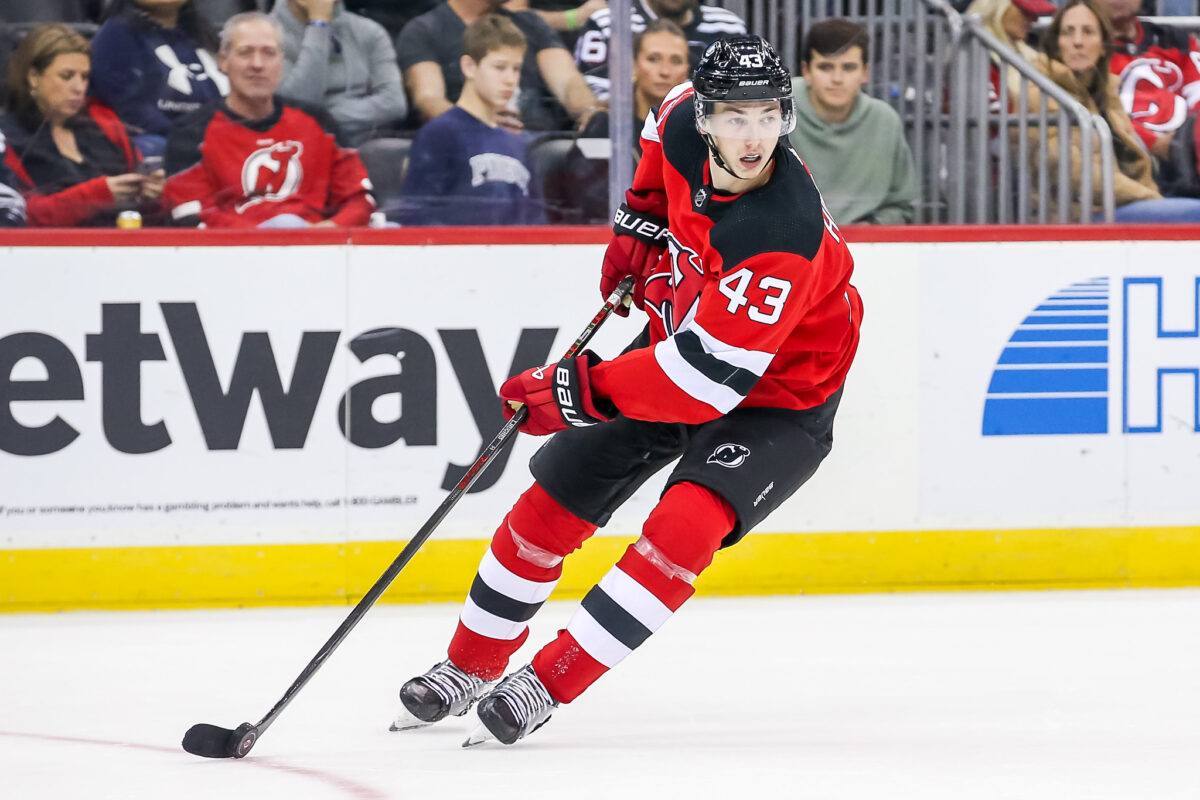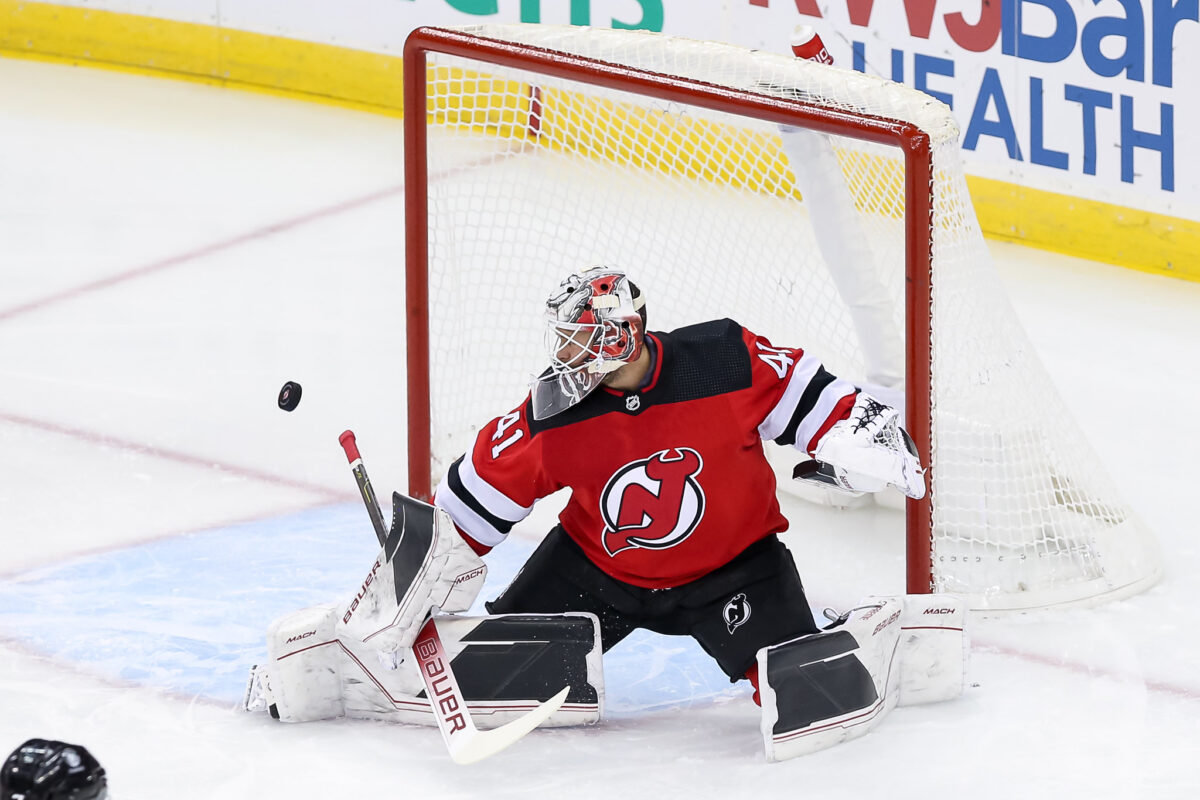Looking to bounce back after a deflating loss to the San Jose Sharks, the Devils took on the third-place Vancouver Canucks last night. In what was dubbed the “Hughes Bowl” by the media, Devils’ stars Jack and Luke Hughes looked to defeat eldest brother Quinn, captain of the Canucks and current frontrunner for the Norris Memorial Trophy.
Despite the victory, several key aspects of the Devils’ game floundered — discipline, goaltending, and the ability to close out a game. The Devils were in the penalty box on four separate occasions against a team whose 27.4% power play entered the night ranked fourth in the NHL — something that cost them early. Later in the game, their lack of closing, mainly a product of poor goaltending, nearly cost them the two points on a night that saw the New York Islanders and New York Rangers fail to bring home wins. Still, the Devils prevailed thanks to a go-ahead goal by Jesper Bratt with well under a minute to go in the third period, securing the win for New Jersey.
Hughes Brothers Don’t Disappoint
This game — the Hughes Bowl — came as advertised. From start to finish, the best players on the ice were the Hughes brothers.
Starting with Jack Hughes, the Devils’ star forward ended the game with three points — a goal and two assists — while pacing the team in shots (six), shot attempts (nine), individual scoring chances (seven), individual high-danger chances (four), and individual expected goals (ixG). He made a couple slip-ups, even costing the Devils a goal against from a sloppy turnover near his own blue line, but he was far and away the most potent Devils skater. He ended the night with the Devils’ fourth-best expected goals share (xGF%), with the Devils controlling 67.60% of the expected goals with Jack on the ice.
Luke Hughes performed extremely well in his own right, too. Despite lackluster 5-on-5 underlying metrics — his xGF% was well below 50% — he was single-handedly responsible for the Devils’ fifth goal. To draw the penalty leading up to the goal, Hughes danced on the offensive blue line in a way akin to Cale Makar and his older brother, causing Dakota Joshua to trip him up because he simply couldn’t keep up with Luke’s moves. 11 seconds later, with less than a minute to go in the second period, he sniped a top-right corner shot off of a tipped feed from his brother.

I’d be remiss if I didn’t mention Quinn Hughes‘ play. He was undoubtedly the Canucks’ best defenseman, and arguably their best player altogether. He was pivotal in the Canucks’ late comeback, supplying the primary assist on their fourth goal and secondary assist on the game-tying goal. Quinn was constantly making moves with his elite edgework and stickhandling skills, deking out aggressive backcheckers and providing his team with the means to make a scary comeback.
First Period Action
Six of the game’s 11 total goals came in the first period, with the Devils getting on the board four times in the frame. It only took 3:40 for the Devils to strike first, with Bratt ripping one past Thatcher Demko on an odd-man rush; and the last four minutes of the period were equally as riveting, with three goals being put in the back of the net.
Related: Devils’ Casey & Hameenaho Set to Play Big Roles at 2024 WJC
All in all, the first period was host to the most expected goals of any period, with 2.69 xG. It was a constant back-and-forth frame, with the Devils seemingly getting all of their chances via odd-man rushes and most of the Canucks’ opportunities coming on the power play. The Devils showed an early lack of discipline, taking two preventable penalties which led to a goal and what should have been another goal had Colin Miller and Nico Hischier not combined for two goal-saving maneuvers on an empty net.
Goaltending Struggles (Again) Late
With two periods in the books, the Devils held a 5-2 lead over Vancouver. Vitek Vanecek had looked locked in during the second period, bailing the Devils out on a few grade-A chances by the Canucks and likely keeping the Devils’ momentum going. All that went up in smoke with 13 minutes to go.
Vanecek, continuing the story for his season, was swimming in the third. He was constantly out of position, looked small in the net, gave up juicy rebounds, and gave fans more than enough anxiety after being the principal cause of a blown three-goal lead. It’s genuinely difficult to blame Vanecek for the fourth goal against — the puck was tipped in front of the net — but he absolutely needs to have one or both of the other two, especially in crunch time. On the game-tying goal, he gave up an inexplicable rebound from what seemed to be an innocuous shot, leading to the easiest tap-in tally of Nils Hoglander’s career.

At some point, enough is enough, and the Devils need to make a move in net. Goaltending has been the Devils’ kryptonite since the season began, and it’s high time that Tom Fitzgerald finds a solution to bring clarity and stability to the goalie position. The Devils’ defense has been above average or elite in practically every metric, yet the team is giving up over four goals per game. Akira Schmid has been shaky, Vanecek has been worse, and it looks like none of the American Hockey League (AHL) goaltenders are ready for NHL time either. A move must be made for an outside candidate.
Quick Hits
- The Devils’ third line of Timo Meier, Dawson Mercer, and Alex Holtz simply did not work last night. In just over 10 minutes of 5-on-5 hockey, the trio combined for just a 20.26% xGF%. They were virtually unable to get anything going in the offensive zone and didn’t do the Devils any services in their own end. I hope that line gets nixed next game.
- Bratt, the night’s savior, was superb. On top of his two goals — the Devils’ first and last — he was tied for the team lead in 5-on-5 shot attempts (seven) and was second on the team in individual high-danger chances with two.
- Kevin Bahl had one of his better games of the season, being a sturdy presence at both ends of the ice. He finished the night with a xGF% of over 70% — second best on the Devils at 5-on-5.
- Simon Nemec stepped into a penalty-killing role, manning what seemed to be the Devils’ top unit. He came into this spot after the Canucks’ power play tally, so with Nemec on the ice, the Devils went 3/3 on the PK.
The Devils’ next game is Thursday night in Seattle, and the Devils should have a prime opportunity to punish a team that has struggled in all three zones — and in the net — this season. I would hope and anticipate a couple small line changes, perhaps moving McLeod back to the third line center role and moving Mercer back onto the wing. Brendan Smith is eligible to return after serving his two-game suspension, too, so it’ll be interesting to see what Fitzgerald and Lindy Ruff do with Nemec considering he’s played so well in his two games of NHL time. Let’s hope the Devils string together a few wins on their road trip, starting with the Kraken.
